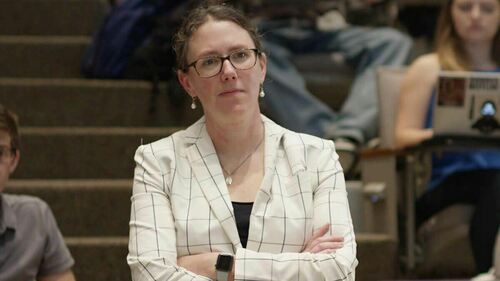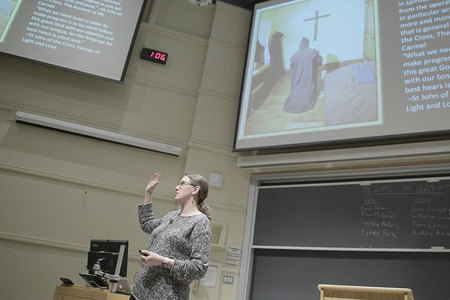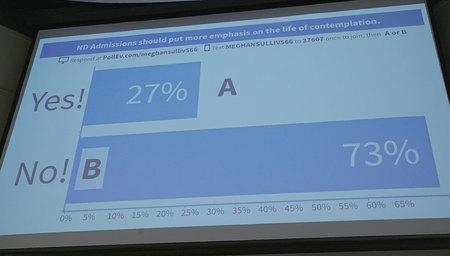
University of Notre Dame philosophy professor Meghan Sullivan has received an $806,000 grant from the The Andrew W. Mellon Foundation to expand her popular God and the Good Life course and adapt it into a curricular model used by faculty across the country.
The three-year award will allow Sullivan to build a network of professors interested in developing or refining their own courses that teach philosophy as a way of life. It will also spur the expansion of God and the Good Life to four to five sections per year — encompassing 600 to 700 students, or one-third of the freshman class.
 Sullivan during a class discussion.
Sullivan during a class discussion.
“We’re very grateful to the Mellon Foundation for their willingness to invest in philosophy education,” Sullivan said. “Notre Dame is committed to the belief that every person can reason well about the major questions facing human lives — and we’re committed to highly innovative and collaborative teaching. This grant gives us the opportunity to share the value of philosophy with a much broader audience, to lead a growing movement in curriculum design and to pursue an ambitious dream for humanities education.”
In God and the Good Life, students have the opportunity to consider, discuss and debate what makes a life moral and what makes a life meaningful. The course tackles such issues as what justifies our beliefs, whether we should practice a religion and what sacrifices we should make for others.
Using classic philosophical arguments, real-world case studies and interactive digital tools, students search for answers and explore their beliefs in both large group discussions and small sustained dialogue groups led by undergraduate fellows who previously took the course.
The Mellon grant will fund week-long curricular development workshops held at Notre Dame each of the next three years, allow for the offering of seed grants for network institutions to start undergraduate fellow programs and provide for a two-year postdoctoral fellow who will conduct research and develop curriculum related to teaching philosophy as a way of life. Faculty will be encouraged to adapt the curricular model to fit their own institutions’ unique cultures.
 Students voting in a live poll via text message, a frequent feature of Sullivan’s class sessions.
Students voting in a live poll via text message, a frequent feature of Sullivan’s class sessions.
The grant will also support the further expansion of the God and the Good Life undergraduate fellows program and fund two graduate fellowships for students interested in integrating the “way of life” form into their research and teaching.
Sullivan — who is co-leading a National Endowment for the Humanities Summer Institute together with faculty from Wesleyan University and Fordham University on the same subjects next month — hopes to build the network across 15 colleges and universities over the course of the next three years.
The Mellon grant, Sullivan said, represents validation that this trend in way of life philosophical education could now grow into an organized, effective movement.
“Many traditions in philosophy have aimed at helping individuals think more deeply and rigorously about the good life. With this grant, we are partnering with universities across the country to imagine new and higher-impact ways to introduce students to these traditions,” said Sullivan, who also serves as director of the University’s philosophy requirement and has a book, "Time Biases: A Theory of Rational Planning and Personal Persistence" (Oxford University Press), out next month.
“We are developing assignments that help students to connect philosophical arguments with their own day-to-day decision-making. With innovative peer discussion leader programs, a network for faculty to collaborate on course design, and in-depth training for early-career teachers, we want to bring philosophy to life for the next generation of students."
Originally published by at al.nd.edu on June 14.